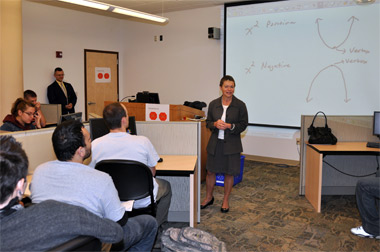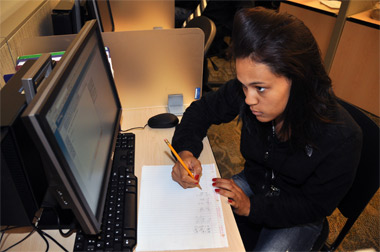
Math in practice -- Southern Illinois University Carbondale Chancellor Rita Cheng talks to a group of mathematics students working at the math lab at Morris Library. Cheng was there to see how a new approach to teaching certain “gateway” mathematics courses is greatly improving student success rates. (Photo by Jeff Garner) Download Photo Here
May 05, 2011
New approach in math classes benefits students
CARBONDALE, Ill. -- Mathematics is as old as civilization, but the way it is taught hasn’t always changed with the times and kept up with the way students learn, stopping too many of them from attaining their educational goals.
A new approach to teaching certain math classes at Southern Illinois University Carbondale, however, is showing great success in lifting students over the barrier that too often has kept students out of the more technical subject areas of their choice and in many cases caused them to abandon their educations completely.
Last fall semester, after three years of study, faculty in the Department of Mathematics tested a new model for teaching a “gateway” course, College Algebra (Math 108). The pilot approach incorporated a weekly, interactive software instructional laboratory to go along with twice-weekly lectures and open lab time. Gateway courses are so-named because they are the first courses that students in science, engineering and business disciplines must pass before moving on to more advanced mathematics and core subject courses in their major.
This spring, with a semester’s worth of data under their belts, faculty are using the new approach to teach all sections of Intermediate Algebra (Math 107) and College Algebra (Math 108). The shift came after officials saw dramatic improvements in the percentage of students who successfully complete the courses using the new approach pushed by mathematics faculty members Greg Budzban and Dan Mussa.
On Wednesday, May 4, Chancellor Rita Cheng met with Budzban, Mussa and a host of students, teaching assistants and others involved in the effort to learn more about its success and discuss ways to build on it.
Cheng, who also is a professor of accounting, told the students in the math lab at Morris Library that the new approach is aimed at helping them succeed, even if math isn’t their favorite subject.
“Not everyone loves math, or at least not everyone begins college believing they will love math, because of experiences in past math classes” that may have discouraged them, Cheng told the students and staff in the lab. “Our data shows that the No. 1 reason students leave SIU is their frustration over some of our gateway courses, math being one of the primary ones. So we are making sure you have the best instructors and state-of-the-art technology to make sure you have the best learning outcome.”
“It’s so important because math concepts are present in a lot of different disciplines. Our goal is for every student to have a successful outcome in this class, and prepare you to go on to other classes knowing that you performed well in math and that you can be as successful in every class,” Cheng said.
After last fall’s pilot program showed promise, the University beefed up the math lab, redesigning its layout to promote open discussion and adding more computers and other technology. About 535 students are now taking those classes with about 750 expected next fall.
The lab time each week allows for more individual interaction with students, Budzban said, but students also can access the lab software online from any computer location.
The computerization of homework assignments also provides for instant feedback and an increase in graded assignments, both of which help increase the time students must devote to their study of the subject, which in turn equates to more successful outcomes.
Budzban said many universities struggle with the varying mathematics backgrounds of their incoming students. The new approach, which uses software that provides students with learning aids such as video, animations, assignments and customized study plans, is tailored toward the way today’s students learn.
“Every student at SIUC has to pass a math course to graduate, so it means more success in terms of simply graduating,” said Budzban, professor and interim chair of the mathematics department. “But a lot of times that initial math hurdle represents a make-or-break for students in terms of retaining them on campus. Once they make it through their math classes, for a lot of students it’s all down hill.”
“It also allows many students to stay in the majors they initially wanted to be in,” said Mussa, visiting assistant instructor in mathematics, who began working with the concept several years ago and now directs the math lab. “It's one thing to change majors because you learn more about yourself and what you want to do. It’s another to change major because you can’t handle the mathematics involved. So that’s something we wanted to address too.”
Math, as everyone knows, is about numbers. And these numbers speak for themselves.
Last fall, students taking Math 107 and 108 in a “traditional” setting successfully completed the classes at a rate of just 39.4 percent. Students taking the classes under the new model, however, were successful more than 80 percent of the time.
Lisa Peden, director of Learning Support Services at SIUC, said she is getting positive feedback from students on the new program.
“They love it,” she said. “I think what they really like about the lab is the ability to work with someone or even work alone but know that there is someone there to help them. That’s the kind of open environment we wanted to create.”
Donielle Daway, a freshman accounting major from Belleville, told Cheng the new approach is working well for her.
“I like this a lot better,” she said. “If you need help (the software) points things out in small bits and pieces, so I think I learn better in here.”
Brian Reaves, a graduate teaching assistant in mathematics from Du Quoin, told Cheng he is noticing big improvements among his students in the program.
“I can tell a big difference,” Reaves said. “This is so much more hands-on and students feel more comfortable asking questions. It also helps having the tutors here and makes the students more comfortable going to the tutoring sessions. I feel like it really helps and the grades are showing that.”
Cheng thanked the mathematics faculty for piloting the new approach and the library staff for helping promote and house the math lab. She and others planned to discuss expanding the model to other mathematics courses, such as Math 113, which is in great demand.
“It’s been an incredible success and a great partnership,” Cheng said.

A new approach to math -- Donielle Daway, a freshman accounting major
from Belleville, works on a computer at the math lab at Southern Illinois
University Carbondale's Morris Library. Daway is one of many students
benefitting from a new approach to teaching certain "gateway" mathematics
courses at SIUC. (Photo by Jeff Garner) Download Photo Here
